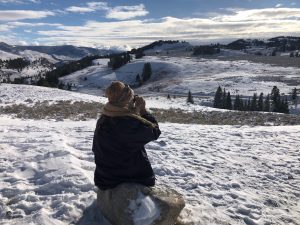The FPC, the SIU School of Communication Studies, and the American Institute of Philosophical and Cultural Thought (AIPCT) are pleased to announce the 2023 Lewis E. Hahn lectures, honoring the work and ideas of Erin McKenna. This year, in addition to Professor McKenna, we welcome Lee McBride and Tess Varner to speak on the honoree’s work. The date is Saturday, July 15, 2023. The in-person event is at 411 N. 9th Street, Murphysboro, IL, 62966. Open to the public. No reservation is needed.
To attend on-line, send a request for a Zoom link to: personalist61@gmail.com
Schedule
2:00 PM Central Time (US):
Tess Varner, Erin McKenna and the [Ongoing] Task of Utopia: Ecofeminist and Pragmatist Vision for the Wild World. The lecture is here.
4:00 PM Central Time (US):
Lee McBride III, (Re)imagining Our Bonds and Ties. The lecture is here.
5:30 Pizza for the in-person attendees, courtesy of FPC
6:30 PM Central Time (US):
Erin McKenna, Facing the Future: Human’s Embodied Continuity with the Rest of Nature. The lecture is here.
The Lectures
Erin McKenna, University of Oregon
Facing the Future: Human’s Embodied Continuity with the Rest of Nature
Today humans face many difficult situations. Some are widely shared (such as pollution and climate change), while others are more specific to particular groups (such as the inequalities and oppression that follow from racism, sexism, ageism, classism, colonialism, speciesism and other isms). I believe that many of these difficulties are a consequence of patriarchal views embedded in Western philosophy and many monotheistic religions. Following many ecofeminist thinkers, I critique the dualistic and hierarchal nature of these philosophical views in order to expose the logics of domination and colonization that follow from them. In my work I have found pragmatism to be a useful ally as it sees humans as continuous with the rest of nature and resists dualistic ways of thinking. Challenging and changing these long-held patterns of thinking is not easy but I think necessary. We need to develop new patterns of thinking that encourage humans to learn to share this world with each other and with the rest of nature. One key component of that shift is understanding that humans are animals and are continuous and interdependent with the rest of nature. While some see philosophy that focuses on environmental or animal issues as some kind of special case of applied ethics, here I argue that such work is central for rethinking our metaphysical understanding of the human place and relation to others. This, then, influences understandings of epistemology, ethics, and social and political philosophy. Coming to understand ourselves as embodied beings who share much in common with the rest of life might enable us to arrive at philosophical views and approaches that can help us really wrestle with the difficulties that have resulted from many humans denying our bodies, our limits, and our deaths.
Lee A. McBride III, The College of Wooster
(Re)imagining Our Bonds and Ties
Erin McKenna, preeminent pragmatist and ecofeminist, urges us to rethink our relationships, our connections to wild and domesticated animals. In The Task of Utopia (2001), she articulates a process model of utopian thought, evoking utopian literature to distinguish this pragmatist feminist model from other models of utopia. In subsequent books, Pets, People, and Pragmatism (2013) and Living with Animals (2021), McKenna argues that there is a continuity between human beings and other living creatures, and that the careful understanding of the needs and predilections of these other creatures can help us to create ameliorative relationships with animals and the land. Hence, McKenna suggests that utopian visions and attentive perception (into the lives of other living beings) can help us to imagine new ameliorative ways to live with flora and fauna—to reimagine our bonds and ties. In this paper, I seize upon McKenna’s pragmatist feminist utopian thought and tie this together with sharp-eyed ecofeminism, hoping to engage in the (re)imagining of bonds and ties that suture us to other living organisms.
Tess Varner, Concordia College
Erin McKenna and the [Ongoing] Task of Utopia: Ecofeminist and Pragmatist Vision for the Wild World
Erin McKenna has already had a prolific and boundary-crossing career, evidenced in her influential teaching, mentorship, and published work as well as her community engagement and service to philosophical societies. In The Task of Utopia: A Pragmatist and Feminist Perspective, published more than twenty years ago, McKenna gleaned insights from feminist science fiction, establishing an approach to utopian thinking that could help humans strive toward better futures. Since the publication of that first major monograph, McKenna’s work has gone in many fruitful directions, with an emphasis on improving relationships between humans and other-than-human animal beings, including a current focus on the development of a pragmatist and ecofeminist wildlife ethic. In this paper, I explore how this utopian vision continues to guide McKenna’s work on and with wild animals. Further, I consider how the task of utopia that McKenna articulated bears on the present moment, examining contemporary utopian projects through the lens of her philosophical approach and demonstrating the ongoing aptness of her feminist and pragmatist perspective, especially in a moment where the future itself is thrown more and more into question.
The Speakers
 Erin McKenna is Professor of Philosophy at the University of Oregon. She currently serves as a co-editor of Hypatia: A Feminist Journal of Philosophy and Hypatia Reviews Online. She has chaired the APA Committee on Teaching Philosophy and the Committee on the Status of Women. A former president of the Society for the Advancement of American Philosophy, her work is rooted in the traditions of American pragmatism and ecofeminism. Her books and articles focus on providing a pragmatist feminist approach to issues in social and political philosophy and animal ethics. Her first book, The Task of Utopia: A Pragmatist and Feminist Perspective (2001) was followed by a series of books on animal ethics: Pets, People, and Pragmatism (2013), Livestock: Food, Fiber, and Friends (2018), and Living with Animals: Rights, Responsibility, and Respect (2020). She is co-author, with Scott L. Pratt, of American Philosophy: From Wounded Knee to the Present (2015). She has also co-edited three books: Animal Pragmatism (2004 with Andrew Light), Jimmy Buffett and Philosophy (2009 with Scott L. Pratt), and Pragmatist Feminism and the Work of Charlene Haddock Seigfried (2022 with Lee A. McBride III). She is currently working on a book on an approach to wildlife ethics which is co-authored with Mary Trachsel and Tess Varner.
Erin McKenna is Professor of Philosophy at the University of Oregon. She currently serves as a co-editor of Hypatia: A Feminist Journal of Philosophy and Hypatia Reviews Online. She has chaired the APA Committee on Teaching Philosophy and the Committee on the Status of Women. A former president of the Society for the Advancement of American Philosophy, her work is rooted in the traditions of American pragmatism and ecofeminism. Her books and articles focus on providing a pragmatist feminist approach to issues in social and political philosophy and animal ethics. Her first book, The Task of Utopia: A Pragmatist and Feminist Perspective (2001) was followed by a series of books on animal ethics: Pets, People, and Pragmatism (2013), Livestock: Food, Fiber, and Friends (2018), and Living with Animals: Rights, Responsibility, and Respect (2020). She is co-author, with Scott L. Pratt, of American Philosophy: From Wounded Knee to the Present (2015). She has also co-edited three books: Animal Pragmatism (2004 with Andrew Light), Jimmy Buffett and Philosophy (2009 with Scott L. Pratt), and Pragmatist Feminism and the Work of Charlene Haddock Seigfried (2022 with Lee A. McBride III). She is currently working on a book on an approach to wildlife ethics which is co-authored with Mary Trachsel and Tess Varner.
 Lee A. McBride III is professor of philosophy at The College of Wooster (Ohio). McBride specializes in American philosophy, ethics, political philosophy, and philosophy of race. He is the author of Ethics and Insurrection: A Pragmatism for the Oppressed (Bloomsbury, 2021) and has published articles on insurrectionist ethics, racism, pragmatist feminism, food ethics, anger, leftist politics, and decolonial philosophy. McBride is the editor of A Philosophy of Struggle: The Leonard Harris Reader (Bloomsbury, 2020) and co-editor (with Erin McKenna) of Pragmatist Feminism and the Work of Charlene Haddock Seigfried (Bloomsbury, 2022). McBride is currently writing a short monograph on the philosophy of W.E.B. Du Bois (under contract with Indiana University Press), and he is the vice-president/president-elect (2022-2024) of the Society for the Advancement of American Philosophy (SAAP).
Lee A. McBride III is professor of philosophy at The College of Wooster (Ohio). McBride specializes in American philosophy, ethics, political philosophy, and philosophy of race. He is the author of Ethics and Insurrection: A Pragmatism for the Oppressed (Bloomsbury, 2021) and has published articles on insurrectionist ethics, racism, pragmatist feminism, food ethics, anger, leftist politics, and decolonial philosophy. McBride is the editor of A Philosophy of Struggle: The Leonard Harris Reader (Bloomsbury, 2020) and co-editor (with Erin McKenna) of Pragmatist Feminism and the Work of Charlene Haddock Seigfried (Bloomsbury, 2022). McBride is currently writing a short monograph on the philosophy of W.E.B. Du Bois (under contract with Indiana University Press), and he is the vice-president/president-elect (2022-2024) of the Society for the Advancement of American Philosophy (SAAP).
 Tess Varner is Associate Professor of Philosophy and the Director of Women’s and Gender Studies at Concordia College in Moorhead, Minnesota. Her areas of specialization are American Philosophy, Environmental Ethics, and Feminist Philosophy. She is the author of two book chapters: “Jane Addams and Twenty-First-Century Refugee Resettlement: Toward the Substitution of Nurture for Warfare,” in The Oxford Handbook of Jane Addams (2023) and “Environmental Axiology in the Stone-Campbell Movement,” in Restoration and Philosophy: New Philosophical Engagements with the Stone-Campbell Tradition (2018), as well as forthcoming works, a chapter in Pragmatist Experiments in Higher Education and a co-authored chapter in John Dewey’s Human Nature and Conduct: A Centennial Handbook. She has authored several articles and reviews in journals such as Hypatia, The Pluralist, The Public Philosophy Journal, Environmental Values, and Organization and Environment. Varner is currently involved in a co-authored book project with Erin McKenna (University of Oregon) and Mary Traschel (University of Iowa) on ecofeminist pragmatist wildlife ethics and for an upcoming sabbatical is developing a manuscript proposal on a pragmatist philosophy of public lands.
Tess Varner is Associate Professor of Philosophy and the Director of Women’s and Gender Studies at Concordia College in Moorhead, Minnesota. Her areas of specialization are American Philosophy, Environmental Ethics, and Feminist Philosophy. She is the author of two book chapters: “Jane Addams and Twenty-First-Century Refugee Resettlement: Toward the Substitution of Nurture for Warfare,” in The Oxford Handbook of Jane Addams (2023) and “Environmental Axiology in the Stone-Campbell Movement,” in Restoration and Philosophy: New Philosophical Engagements with the Stone-Campbell Tradition (2018), as well as forthcoming works, a chapter in Pragmatist Experiments in Higher Education and a co-authored chapter in John Dewey’s Human Nature and Conduct: A Centennial Handbook. She has authored several articles and reviews in journals such as Hypatia, The Pluralist, The Public Philosophy Journal, Environmental Values, and Organization and Environment. Varner is currently involved in a co-authored book project with Erin McKenna (University of Oregon) and Mary Traschel (University of Iowa) on ecofeminist pragmatist wildlife ethics and for an upcoming sabbatical is developing a manuscript proposal on a pragmatist philosophy of public lands.
|
 The Lewis Hahn Memorial Lecture is a periodic summertime lecture sponsored by the FPC. It was begun in 2012, in honor of Lewis Edwin Hahn, 1908-2004. Lewis Hahn was raised in west Texas, took his Ph.D. at the University of California, Berkeley, in 1939, under the direction of Stephen Pepper. He had a full and successful career in the Philosophy Department of Washington University in St. Louis, being recruited to Southern Illinois University Carbondale in 1973. He was author of several books and many articles and was especially distinguished by his efforts in comparative philosophy and inter-cultural philosophical and religious dialogue. From 1981 until 2001 he edited the prestigious Library of Living Philosophers. He served the Societies and the Foundation for the Philosophy of Creativity, in several offices and principally as its Secretary/Treasurer, from its founding in 1957 until his retirement from active service in the profession in 2001.
The Lewis Hahn Memorial Lecture is a periodic summertime lecture sponsored by the FPC. It was begun in 2012, in honor of Lewis Edwin Hahn, 1908-2004. Lewis Hahn was raised in west Texas, took his Ph.D. at the University of California, Berkeley, in 1939, under the direction of Stephen Pepper. He had a full and successful career in the Philosophy Department of Washington University in St. Louis, being recruited to Southern Illinois University Carbondale in 1973. He was author of several books and many articles and was especially distinguished by his efforts in comparative philosophy and inter-cultural philosophical and religious dialogue. From 1981 until 2001 he edited the prestigious Library of Living Philosophers. He served the Societies and the Foundation for the Philosophy of Creativity, in several offices and principally as its Secretary/Treasurer, from its founding in 1957 until his retirement from active service in the profession in 2001.
Funding for this event is provided by the William and Galia Minor Endowment, SIU School of Communication Studies, and by the Foundation for the Philosophy of Creativity, also founded by William S. Minor.



